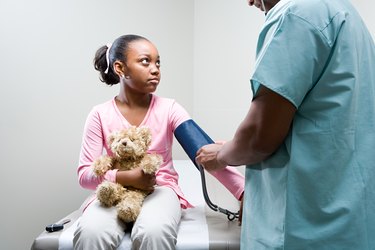
With each beat, the heart forces blood through the body's arteries and veins. The pressure the blood exerts on these vessels is measured as blood pressure -- an important vital sign used by healthcare professionals. Healthy or normal blood pressure readings for children and adolescents are based on gender, height and age, and a teen's blood pressure is in the healthy range if it falls below the 90th blood pressure percentile. Standardized tables that include blood pressure recommendations are readily available for doctors and health care providers to use when caring for the health of teenagers.
Blood Pressure in Teens
Video of the Day
Blood pressure is reported as 2 numbers, such as 120/80. The top reading is the systolic pressure, which represents the pressure the heart exerts when it contracts. The bottom number is termed diastolic, which represents the pressure when the heart relaxes. While abnormal blood pressure levels in adults often gets more attention, elevated blood pressure, or hypertension, is a growing health problem in children and adolescents. Sometimes the cause of hypertension is unknown, but it is more likely to occur if other family members have high blood pressure, and can be related to obesity or kidney disease. Achieving normal or healthy blood pressure readings is the goal, and teens should have their blood pressure checked at every doctor visit.
Video of the Day
Normal Blood Pressure for Teen Boys
Normal blood pressure in adolescents is defined as less than the 90th blood pressure percentile, as outlined in the most recent practice recommendations published in the August 2004 issue of "Pediatrics." Understanding the normal range for a specific teen requires applying the teens age and height percentage from the standard growth charts to the blood pressure chart. For example, a normal blood pressure for a 13-year-old boy, whose height falls in the 50th percentile, is below 122/77. A normal blood pressure for a 17-year-old boy who falls on the 90th percentile for height is below 135/84.
Normal Blood Pressure for Teen Girls

Interpretation of blood pressure measurements is similar for teen girls. A normal blood pressure in a 13-year-old girl at the 50th percentile for height is below 121/77. A teen girl who is 17 and falls in the 90th percentile for height has a normal blood pressure range below 127/81. Hypertension is diagnosed if the blood pressure readings persist at or above the 95th percentile, and prehypertension is the zone between normal and hypertension. So, if this same 17-year-old's blood pressure is consistently measured at or above 131/85, she would be diagnosed with hypertension.
Warnings
Any child or adolescent with elevated blood pressure readings needs to see a doctor regularly and follow the prescribed treatment plan, which may include healthy diet, weight loss and exercise -- and sometimes medications. The teen's specific blood pressure targets, in order to achieve healthy blood pressure levels, will be outlined by his doctor. High blood pressure generally causes no symptoms, so regular measurements are important to monitor progress. A teen needs immediate medical attention if he develops severe headaches, seizures, chest pain, shortness of breath, a sudden onset of weakness, vision changes, difficulty speaking or back pain.
Reviewed by Kay Peck, MPH RD
- Circulation: How to Define Hypertension in Children and Adolescents
- American Family Physician: High Blood Pressure in Children and Adolescents
- National Heart, Blood and Lung Institute: Blood Pressure Tables for Children and Adolescents
- The Fourth Report on the Diagnosis, Evaluation, and Treatment of High Blood Pressure in Children and Adolescents: Blood Pressure Levels for Boys by Age and Height Percentile*
- The Fourth Report on the Diagnosis, Evaluation, and Treatment of High Blood Pressure in Children and Adolescents: Blood Pressure Levels for Girls by Age and Height Percentile*
- Pediatrics: The Fourth Report on the Diagnosis, Evaluation, and Treatment of High Blood Pressure in Children and Adolescents
Is this an emergency? If you are experiencing serious medical symptoms, please see the National Library of Medicine’s list of signs you need emergency medical attention or call 911.